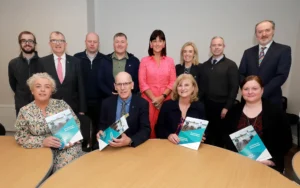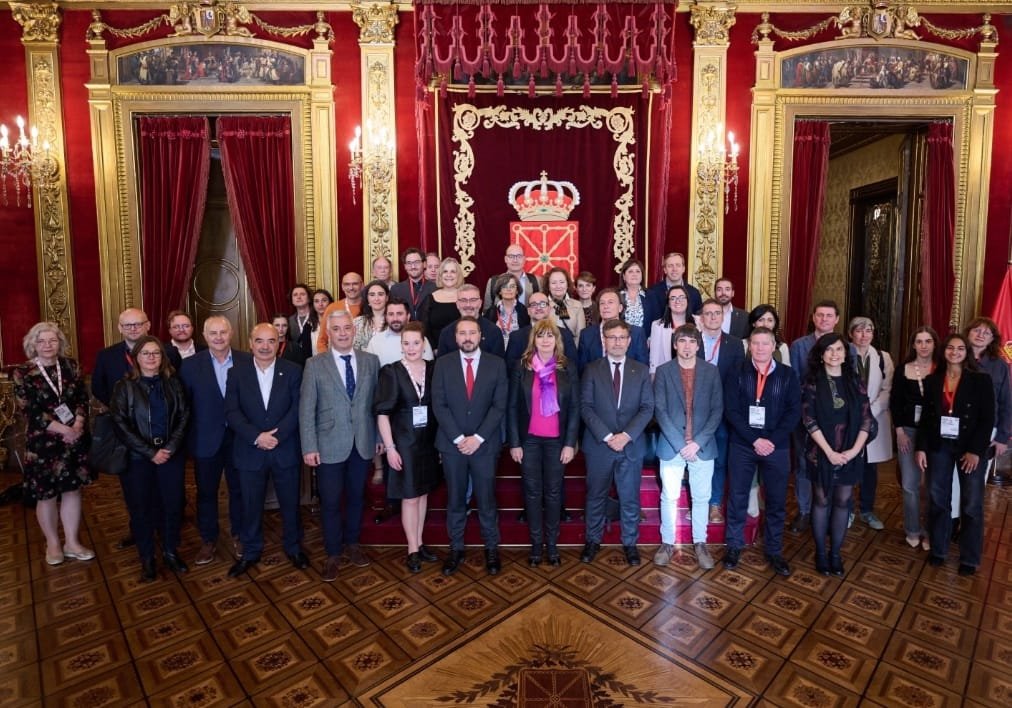
NPLD » NPLD-Coppieters Helsinki Campus
NPLD-Coppieters Helsinki Campus
Share this post:
This campus gathered practitioners and experts in this field from a variety of nationalities to share experiences and knowledge to support language-appropriate practices in healthcare. The discussions during the Campus shared the experiences of the Welsh, Swedish speakers in Finland, New Brunswick and Basque communities. The final part of this event included a panel discussion with all speakers of this event and moderated by the NPLD Vice-Chair of the NPLD and Senior Advisor in International and Nordic Affairs at the Swedish Assembly of Finland (Folktinget).
Bilingual medical degrees in healthcare education: the Welsh experience
Dr. Awen Iorweth an Orthopaedic Consultant CTMUHB and Clinical Lecturer at Cardiff University for Coleg Cymraeg Cenedlaethol was the keynote speaker for this event. In this talk, Dr. Iorweth discussed her experiences as a lecturer at the University of Cardiff where she was responsible for introducing bilingualism in a medical degree programme.
During this talk Dr. Iorweth highlighted that there are three areas where the ability of Welsh is of vital importance; elderly care, paediatrics, and mental health. Additionally, during this talk Dr. Iorweth also underlined the benefits of studying medicine through the Welsh language. Not only does this programme help to develop bilingual doctors, it is also beneficial for enhancing the status of the Welsh language.
Case studies: sharing experiences & raising public awareness
Case 1: the Swedish language community in Finland
Three experts were invited to participate in this discussion: Christina Gestrin, Secretary General of the Swedish Assembly of Finland, Folktinget; Karin Simola, Director of Bilingual Services for the Wellbeing Services County of Southwest Finland; and Fredrica Nyqvist, Senior Lecturer in Social Policy at Åbo Akademi University.
Christina Gestrin highlighted that it is currently difficult to access healthcare services in Swedish and in particular in regions where there are small Swedish-speaking populations. Therefore, she believes that authorities should seek to connect Swedish-speaking professionals with Swedish-speaking clients and patients.
Karin Simola, Director of Bilingual Services at the Wellbeing Services County of Southwest Finland (Varha), discussed the role this organisation has in promoting bilingual healthcare in Finland. Highlighting the focus on developing and promoting bilingualism alongside coordinating and advising on bilingualism issues within the organisation. Karin discussed how the team is managing the development of a Language Strategy for Varha, created in collaboration with every division.
Finally, Fredrica Nyqvist, Senior Lecturer in Social Policy, shared the findings of a comparative study on social inclusion among older adults with a particular focus on linguistic minorities in a national and international context. She argued that linguistic rights are strongly jeopardised by the inability to communicate in Swedish in service encounters and suggested a holistic approach integrating good practices, the effective implementation and enforcement of policies, and improvements in the staff recruitment process.
Case 2: New Brunswick, Canada
Gilles Vienneau, General Director of the Société Santé et Mieux-être en français, discussed the case of a Canadian province: New Brunswick. Observing that New Brunswick has ‘two laws with no teeth’, meaning that citizens enjoy an adequate legal template but have do not have the resources to take advantage of it.
Case 3: the Basque Country, Spain
Josune Retegi Ormazabal, Deputy Director for Human Resources Development and Training at Osakidetza (Basque NHS), and Susana Martín Benavides, Deputy Director for Primary Healthcare at Osakidetza, provided insights on the provision of health services in Basque in the Basque Country. They discussed the Third Basque Language Plan and how it aims to improve the provision of language services to Basque citizens and to make the Basque language a working language in the healthcare environments. Additionally they both highlighted studies that showed promoting the use of the Basque language in healthcare services is a positive undertaking, reflecting the positive development of quality care in a bilingual setting.
Managing languages in officially bilingual territories: challenges & opportunities for the future
Finally, a panel discussion moderated by Anna Jungner-Nordgren and included: Josune Retegi Ormazabal, Deputy Director for Human Resources at Development and Training at Osakidetza, Henrik Wickström, MP and Chair of the Swedish Assembly of Finland (Folktinget), and Dr. Awen Iorweth, Orthopaedic Consultant CTMUHB and Clinical Lecturer at Cardiff University for Coleg Cymraeg, led a lively conversation on the topic, clarifying the various challenges and opportunities in their respective language communities.
In this discussion they identified both challenges and recommendations:
Challenges:
- Lack of personnel language training.
- Poor prior identification of needs
- Organisational culture
- Information available in the minority language
- Poor organisational language awareness
- Careful recruitment procedure
- Teamwork
- Communication
Latest news
Pojects
Next events
Related news










